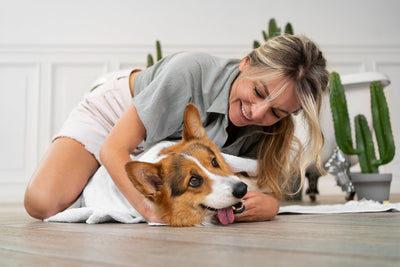Complete Senior Dog Feeding Guide: What to Feed Your Aging Dog for Optimal Health
When your beloved companion reaches their senior years (typically around age 7), their nutritional needs shift dramatically. According to the National Research Council and guidelines from the WSAVA Global Nutrition Committee, senior dog diets should aim to provide moderate energy to prevent obesity, include high-quality, easily digestible protein to maintain muscle mass, offer omega-3 fatty acids for cognitive and joint health, control phosphorus and sodium levels, and include fiber for digestive support.
The reality is simple: the right nutrition can add years to your dog's life and life to their years.
This article provides practical, science-backed feeding plans and daily meal strategies for senior dogs, including breed-specific portions, three-component nutrition approach, and superfoods to optimize health during their golden years.

ON THIS PAGE
Is your beloved dog entering their golden years? Senior dogs have unique nutritional needs that differ significantly from their younger counterparts. This comprehensive guide reveals the science-backed feeding strategies that can help your aging companion live their healthiest, happiest life.
🎯 Quick Answer: Senior dogs thrive on a three-component feeding strategy combining premium dry food, wet food, and fresh ingredients. This approach maximizes nutrition while addressing age-related challenges like decreased appetite, joint issues, and kidney health concerns.
🔬 The Science-Backed Three-Component Senior Dog Diet
Veterinary nutritionists recommend combining three types of food to maximize nutrition, palatability, and health benefits for senior dogs:
1. 🦴 Premium Senior Dry Food (Foundation)
Premium senior kibble serves as your dog's nutritional foundation:
- ✅ Provides baseline nutrients and supports dental health through chewing action
- ✅ Choose formulas with 22-26% protein and 10-15% fat for optimal senior nutrition
- ✅ Look for added glucosamine and chondroitin to support aging joints
- ✅ Benefits digestive health with easily digestible proteins
Recommended brands: Royal Canin Maxi Aging 8+, Farmina N&D Mini Senior
2. 🥫 High-Quality Wet Food (Hydration & Appeal)
Senior wet food addresses critical age-related needs:
- 💧 Enhances hydration - crucial for kidney health in aging dogs
- 🍽️ Increases palatability for dogs with decreased appetite
- 🤲 Easier to digest and gentler on sensitive senior stomachs
- 💦 Higher moisture content helps prevent dehydration
3. 🥕 Fresh Home-Cooked Components (Targeted Nutrition)
Fresh ingredients provide targeted health benefits:
- 🐟 Omega-3 fatty acids for brain and joint health
- 🛡️ Antioxidants to support immune function
- 🎯 Customizable nutrition for specific health conditions
- ⚡ Most bioavailable nutrients for optimal absorption
📊 How Much Should I Feed My Senior Dog? Daily Feeding Guidelines
🐕🦺 Standard Senior Dog (45-55 lbs, moderately active)
| Component | Amount per Meal | Daily Purpose |
|---|---|---|
| 🦴 Senior Dry Kibble | 100-120g | Baseline nutrition, dental support |
| 🥫 Senior Wet Food | 100g | Hydration, appetite stimulation |
| 🥕 Fresh Components | 100g total | Omega-3s, antioxidants, digestibility |
📈 Total Daily Calories: 1,000-1,200 kcal
⏰ Feeding Schedule: Split into 2 meals (morning and evening)
💧 Fresh water: Available 24/7
🎯 Best Senior Dog Food by Breed: Customized Feeding Plans
Different breeds face unique challenges as they age. Here are three science-based feeding plans:

🐕 Large Breed Senior Dog Food: Labrador Retriever (66 lbs)
⚠️ Common issues: Obesity and joint problems
📋 Daily Feeding Plan:
- 🦴 Dry food: 140g joint-support senior kibble
- 🥫 Wet food: 120g low-fat, joint-friendly formula
- 🥕 Fresh mix: Lean chicken (60g) + sweet potato (40g) + spinach (10g) + fish oil (1 tsp) + turmeric (pinch)
📊 Nutritional Profile:
- 🔥 Calories: 1,200-1,400 kcal/day
- 💪 Protein: 22-26% dry matter
- 🥑 Fat: 10-15% (controlled for weight management)
🐾 Small Breed Senior Dog Food: Pomeranian (9 lbs)
🎯 Needs: Nutrient density and dental-friendly options
📋 Daily Feeding Plan:
- 🦴 Dry food: 30g small-breed senior kibble
- 🥫 Wet food: 80g palatable senior canned food
- 🥕 Fresh mix: Cottage cheese (20g) + grated carrots (10g) + rice (10g) + flaxseed oil (¼ tsp)
⚠️ Note: Only use cottage cheese if your dog isn't allergic to dairy
📊 Nutritional Focus:
- 🔥 Calories: 250-300 kcal/day
- 🎯 Emphasis: Soft textures, antioxidants, joint support
🐺 Large Working Breed: German Shepherd (77 lbs)
🎯 Needs: Joint, digestive, and immune support
📋 Daily Feeding Plan:
- 🦴 Dry food: 180g large-breed senior kibble with glucosamine/chondroitin
- 🥫 Wet food: 150g digestive formula senior wet food
- 🥕 Fresh mix: Turkey (70g) + pumpkin (40g) + oats (40g) + green beans (20g) + fish oil (1 tsp)
📊 Nutritional Profile:
- 🔥 Calories: 1,400-1,600 kcal/day
- 🦠 Special focus: Probiotics for digestive health
🌟 Senior Dog Superfoods: Essential Nutritional Boosters
These nutrient-dense additions can significantly improve your senior dog's health:

🧠 Brain Health and Cognitive Support
- 🫐 Blueberries: 4-6 berries mashed into food (rich in brain-boosting anthocyanins)
- 🐟 Sardines in water: 1-2 small sardines weekly (omega-3 DHA/EPA for cognitive function)
- 🥥 Coconut oil: ¼ teaspoon daily (MCTs provide brain energy)
🦴 Joint Health and Mobility Support
- 🌿 Turmeric paste: ¼ teaspoon with black pepper and oil (powerful anti-inflammatory)
- 🍲 Bone broth (unsalted): 1-2 tablespoons over kibble (natural collagen source)
- 🍠 Sweet potato: 1-2 tablespoons mashed (beta-carotene for joint health)
🤲 Digestive Health Support
- 🎃 Pumpkin (cooked): 1-2 tablespoons (soluble fiber for healthy digestion)
- 🌱 Chia seeds: ½ teaspoon soaked overnight (fiber + omega-3s)
⚠️ Important: Always introduce new foods gradually and consult your veterinarian if your dog has kidney, liver, or heart conditions.
📏 Critical Senior Dog Feeding Guidelines
⚖️ Portion Control and Weight Management
Senior dogs are prone to weight gain due to decreased activity and slower metabolism:
- 📊 Use measuring cups or kitchen scales - never estimate portions
- 📈 Monitor Body Condition Score (BCS) monthly using the 1-9 scale
- 🔄 Adjust portions based on activity level and weight changes
- 💧 Provide constant access to fresh, clean water
🔄 Safe Food Transition Protocol
When changing your senior dog's diet:
- 📅 Day 1-3: 25% new food, 75% current food
- 📅 Day 4-6: 50% new food, 50% current food
- 📅 Day 7-9: 75% new food, 25% current food
- 📅 Day 10+: 100% new food
👁️ Watch for digestive upset or appetite changes during transitions.
🚨 Warning Signs: When to Contact Your Veterinarian
Contact your vet immediately if you notice:
- 🚫 Sudden appetite loss lasting more than 24 hours
- ⚖️ Rapid weight gain or loss (more than 1-2 lbs per month)
- 💧 Changes in drinking habits (excessive thirst or decreased water intake)
- 😣 Difficulty chewing or swallowing food
- 🤢 Vomiting or diarrhea lasting more than 24 hours
❓ Frequently Asked Questions About Senior Dog Nutrition
⏰ How often should I feed my senior dog?
Feed senior dogs twice daily rather than once. Smaller, frequent meals are easier on their digestive system and help prevent bloat. Split their daily food allowance into morning and evening meals.
🍼 Can I feed my senior dog puppy food for extra calories?
No. Puppy food is too high in calories and phosphorus for senior dogs, which can strain aging kidneys. Senior dogs need fewer calories but higher quality nutrients. Stick to age-appropriate senior formulas.
🥩 What's the best protein source for senior dogs?
Easily digestible, high-quality proteins work best for senior dogs. Good options include chicken, turkey, fish, and eggs. Avoid low-quality meat by-products or excessive plant proteins that are harder to digest.
⚖️ How do I know if my senior dog is overweight?
Use the Body Condition Score: you should feel your dog's ribs easily with light pressure, see a visible waist when looking from above, and notice an abdominal tuck when viewing from the side. If ribs are hard to feel, your dog may be overweight.
💊 Should I give my senior dog supplements?
Many senior dogs benefit from joint supplements (glucosamine/chondroitin), omega-3 fatty acids, and probiotics. However, always consult your veterinarian before adding supplements, as some may interact with medications or health conditions.
🎯 Key Takeaways for Senior Dog Feeding Success
-
✅ Use the three-component strategy - Combine premium dry food, wet food, and fresh ingredients for optimal senior nutrition
-
✅ Monitor portions carefully - Senior dogs need fewer calories but higher nutrient density; measure food and track body condition monthly
-
✅ Customize by breed size - Large breeds need joint support and weight management; small breeds require nutrient-dense, easy-to-chew options
-
✅ Prioritize hydration - Wet food and constant fresh water access support kidney health in aging dogs
-
✅ Add strategic superfoods - Blueberries, turmeric, and fish oil provide targeted health benefits when used correctly
-
✅ Transition foods gradually - Introduce new foods over 7-10 days to prevent digestive issues
-
✅ Work with your veterinarian - Regular monitoring and professional guidance ensure optimal nutrition for your senior dog's changing needs
🚀 Ready to optimize your senior dog's nutrition? Start with small changes and monitor your dog's response. For personalized feeding plans, especially if your dog has specific health conditions, consult with a veterinary nutritionist.



